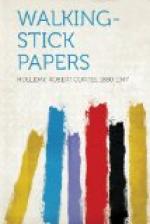There was an ancient character going along the road. He walked with a staff, a crooked stick. His coatless habit was the colour of clay; his legs were bound about just below the knee by a strap (wherein, at one side, he carried his pipe), so that his trowsers flared at the bottom like a sailor’s; over his shoulder he bore a flat straw basket. Under his chin were whiskers; his eyes were merry and bright and his cheeks just like fine rosy apples, with a great high light on each. I asked of him the way and we trudged along together. “You are from Mericy,” he said with delight.
He told me about himself. He was seventy-four and he had never had “a single schooling” in his life. Capel was his home, a village of about twenty houses which we were approaching, thirty miles or so from London. The last time he been to London was when he was fifteen. He had then seen some fireworks there. No fireworks in Capel, he said, had ever been able to touch him since. He had been pushing on, he said, pushing on, pushing on all the while.
“You were not born in Capel, then?” I said.
Born in Capel! Why, he had been born seven miles from Capel.
The difficulty was that I had overlooked the fact that everybody goes out of London town at Whitsuntide. Village and county town I tried and I could not find where to lay my head. Everything was, as they say in England, “full up.” It was coming on to rain and the night fell chill and black. Would I have to use my rucksack for a pillow and sleep in the fields?
At length I found a man—it was at quaint Godalming, I think, where the famous Charterhouse School is—who could not give me a room, but offered me a bed and breakfast at half a crown. “There’s another fellow up there,” he said. “But he’s a nice, quiet fellow; something like yourself,” he said. “I think you’ll like him.”
“You are an American,” remarked my landlord. I sat with him in his little parlour behind the bar. It had a gun over the mantelpiece, a great deal of painted china and a group of stuffed birds in a glass case. He asked me if I liked reading, because, if I did, he had an old dictionary to which I was welcome at any time.
At length it was the hour for bed. I followed my heavy host with his candle up difficult stairs. “I think they’re all asleep,” he said.
“They’re all asleep!” I exclaimed. “Who are?”
“Why,” replied my landlord, “there are five of them, you know. But they are nice quiet fellows. Something like yourself,” he added. “I think you will like them.”
In that shadowed, gabled room were the noises of many sunk in slumber. Well, they were, I found in the morning, rather inoffensive young fellows, all cyclists, and indeed not altogether unlike myself. It was after my bacon and eggs that I found on my way a place for a “wash and brush up, tuppence.”
“Traveller, sir?” inquired the publican, in response to my knock and peering cautiously out at his door. For it was Sunday, after three o’clock in the afternoon and not yet six; and to obtain refreshment at a public house at that hour one must be a “traveller over three miles’ journey.” “I’m a traveller all the way from the U.S.A.,” said I.




